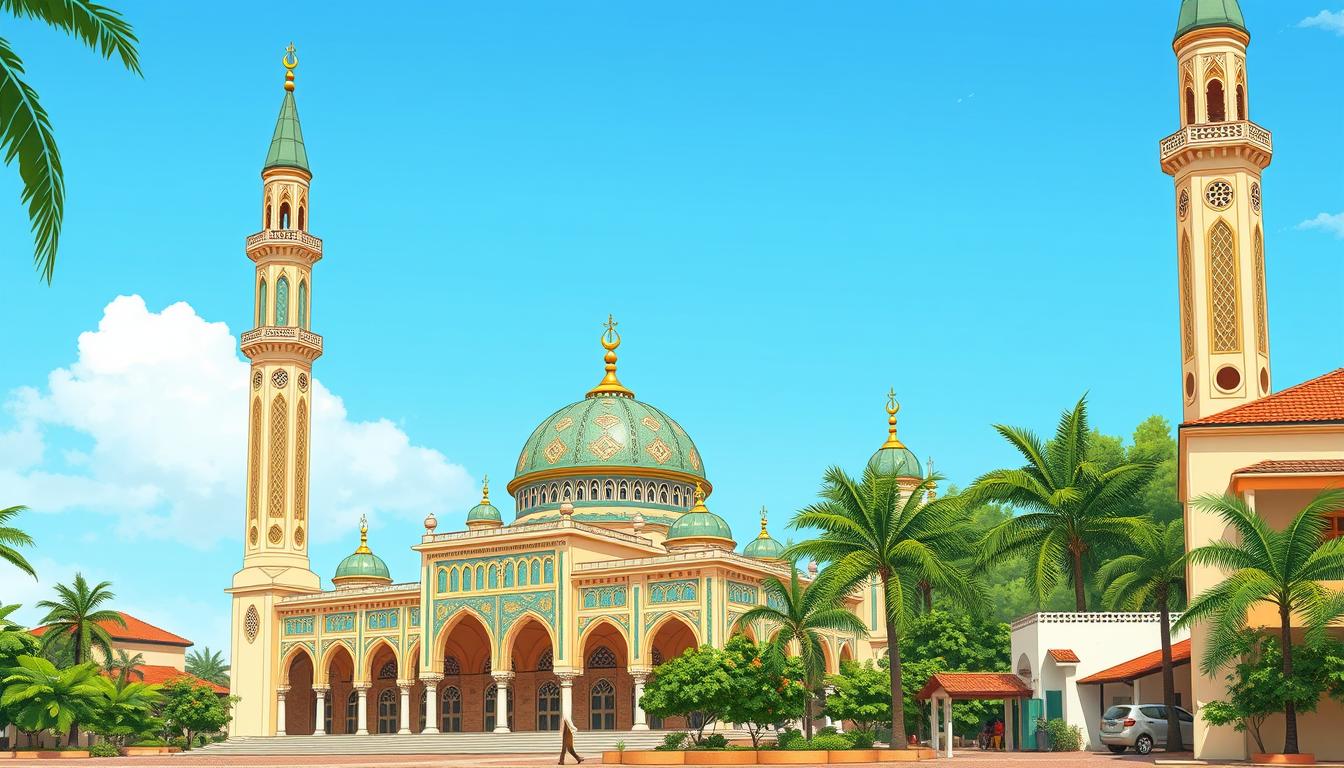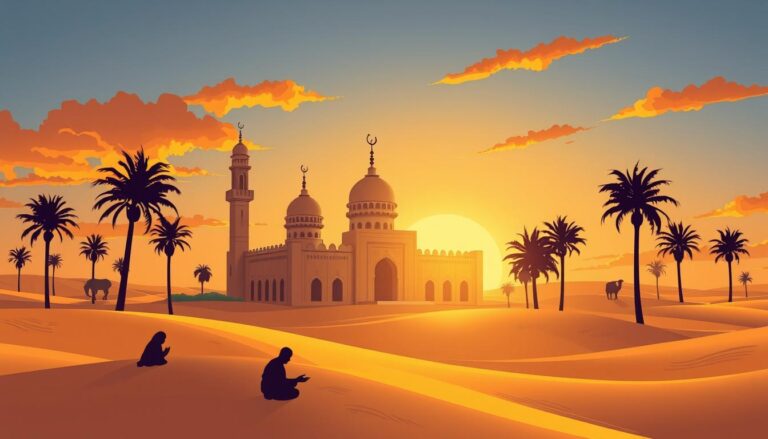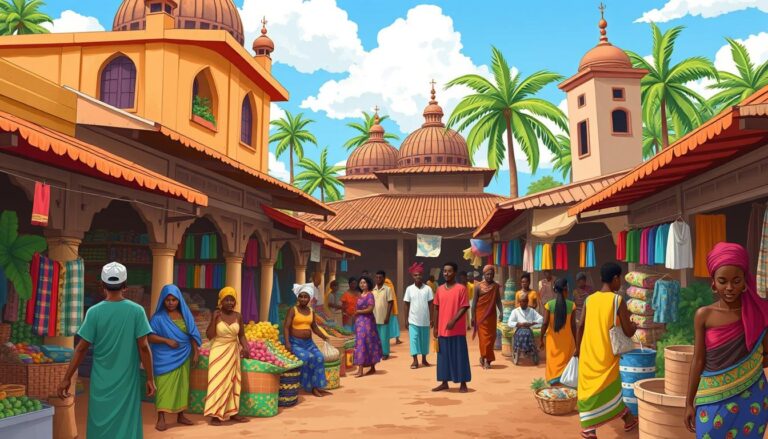Islam in Gambia
Gambia, a small West African nation, is mostly Muslim. Islam makes up 97% of its 2 million people. The first Muslims arrived in the 11th century. Since then, Islam has deeply influenced Gambia’s culture, society, and politics.
The majority of Gambia’s Muslims are Sunni. They follow the Maliki school of jurisprudence. Sufi orders like the Tijaniyya and Qadiriyya also play a big role in Islamic practices here.
While Sunni Islam is the main religion, there’s also a smaller Shiite community. This comes from Lebanese and Arab immigrants. The Ahmadiyya movement, a reformist branch of Islam, has about 50,000 followers in Gambia as of 2022.
Gambia is not just Muslim. It also has a small but important Christian population, mostly Roman Catholic. There are also followers of Traditional African religions, Hinduism, and Eckankar.
Introduction to Islam in Gambia
Islam has deeply influenced Gambia since the 11th century. North African Muslim merchants first introduced Islam to the nation. Over time, Islamic scholars helped spread its influence.
Historical Arrival and Spread of Islam
By the 19th century, Islam dominated Gambia. The Soninke-Marabout wars in the 1850s led to many Soninke Gambians converting. This was a key moment in Islam’s historical arrival and spread in Gambia.
Demographic Composition of Muslims in Gambia
Today, most Gambians, between 85% to 90%, follow Islam. This makes Gambia mostly Muslim. A smaller number practice other religions like Roman Catholicism and animism.
“The success of Islam in The Gambia is attributed to factors such as social, political, and economic influences, along with association with wealthy traders and Islamic civilizations.”
The spread of Islam in Gambia has been boosted by Arabic literacy and Islamic architecture. The country’s Islamic heritage greatly influences its culture, society, and politics.
Sunni Islam: The Predominant Branch
In Gambia, about 95% of Muslims are Sunni. This branch of Islam has a strong presence in the country. It came from the early days of Islam’s arrival and spread.
The Sunni Muslims in Gambia mainly follow the Maliki school of jurisprudence. This school has greatly influenced Sunni Islam in the area.
Maliki School of Jurisprudence
The Maliki school is a major school of Islamic law. It is the main legal tradition for Gambian Sunni Muslims. This school was founded by Malik ibn Anas.
It focuses on practical application of Islamic principles. It also uses local customs and traditions in interpreting religious laws. This is seen in the religious and cultural practices of Gambian Muslims.
Influence of Sufism
Sufism, the mystical branch of Islam, has a big impact in Gambia. The Tijaniyah and Qadiriyah Sufi orders are well-known among Sunni Muslims. They are involved in spiritual and social activities.
Sufism adds to the rich and diverse Islamic faith in Gambia. While most Gambian Muslims are Sunni, a small group doesn’t follow traditional Islamic schools. This diversity shows the changing nature of religious identities in the country.
Islam in Gambia: The Pre-Colonial Era
In the pre-colonial era, Islam grew and became the main religion in Gambia. By the 19th century, most Soninke Gambians had converted to Islam. This change came after the Soninke-Marabout wars in 1850.
The Gambia River helped spread Islam by allowing Muslim traders and scholars to move easily. Gambia’s location on key trade routes also boosted Islamic practices and beliefs.
By the late 19th century, Malinke and Wolof kingdoms had formed in Gambia. The Venetian explorer Alvise Ca’da Mosto visited in 1455. The British managed Gambia from 1821 to 1843, then as a separate colony until 1866.
Today, over 90% of Gambians are Muslim. Many young Gambians go to Saudi Arabia and Egypt for Islamic studies. This strengthens Gambia’s Islamic identity.
“The rapid spread of Islam in Gambia during the 19th century was aided by the navigable Gambia River.”
But not all Gambians support the Islamic shift. A conference by young scholars criticized a female saint’s worship at a grave. This shows different views within the Muslim community.
Islamic reformists in Gambia want to follow the Qur’an and the Prophet Muhammad’s traditions more closely. This change shows Islam in Gambia is evolving, adapting to new social and political changes.
Islam during the Gambia Colony and Protectorate
In the early 20th century, Islam’s influence in Gambia grew. The British allowed an Islamic court to be set up in 1905. They appointed a Qadi, or judge, to handle legal issues for Muslims.
This move gave Muslims more control over their legal affairs. But, the Supreme Court of Gambia, run by the British, could still override these decisions. This showed the complex relationship between colonial rule and Islamic institutions.
Establishment of Islamic Courts
The creation of Islamic courts was a big step. It showed the British valued Islamic law and tradition. These courts let Muslims follow their religious beliefs in legal matters.
But, the British Supreme Court could still change these decisions. This made the relationship between colonial rule and Islamic courts complex.
“The establishment of Islamic courts in Gambia during the colonial period was a significant step towards recognizing the distinct cultural and religious identity of the Muslim population.”
The Islamic courts were key in keeping Muslim traditions alive under British rule. This balance between colonial power and Islamic freedom shaped Gambia’s society and politics for the 20th century.
Islam in Gambia since Independence
Since Gambia gained independence in 1965, Islam and politics have had a complex relationship. The country is officially secular. Over the last 50 years, three presidents have led: Sir Dawda Jawara, Yahya Jammeh, and Adama Barrow.
The Presidencies of Jawara, Jammeh, and Barrow
Under Jawara, Islam was a big part of Gambian life, with over 95 percent Muslim. Yet, the government stayed secular. This changed in 1994 when Yahya Jammeh took power. He wanted to make Gambia more Islamic, even declaring it an “Islamic republic” in 2015.
Adama Barrow, the current president, has moved away from Jammeh’s Islamist plans. He has made Gambia secular again. The government is also working on human rights, like following the Truth, Reconciliation and Reparations Commission’s advice. But, Jammeh’s past and radical Islamic groups are still big issues.
“The Gambia is a state party to all nine core international human rights treaties and the African Charter on Human and Peoples’ Rights.”
Gambia is trying to balance its secular values with Islamic influence. The role of religious groups and the government’s religious policies will keep shaping the country’s future.
Islam in Gambia
Gambia is a country where most people are Muslim. About 96.4% of the population follows Islam, mainly Sunni with Sufism influences. There are also Shiites and Ahmadiyya followers.
The government has a Supreme Islamic Council for advice. Sharia law is used in some legal areas. Islam shapes many parts of Gambian life, from culture to politics.
Yahya Jammeh made Gambia an Islamic republic in 2015. This was after a 1994 coup. He also introduced rules like hair covering for female government workers, later changed.
“The Gambia’s public-debt burden reached about 100% of GDP at the end of 2014, according to the IMF.”
Islam’s role in Gambia’s politics and society is changing. The country balances its secular laws with Islamic influence.
Gambia is known for its religious tolerance. Muslims and Christians often marry. Despite some issues, like between Ahmadiyya and Sunni Muslims, there are no big conflicts.
Islamic Cultural Influences in Gambia
The Islamic culture has deeply influenced Gambian society. It shapes everything from how people dress to their marriage customs. This shows how Islam is a big part of this West African nation.
Dress Code and Marriage Practices
Former President Jammeh once tried to make a dress code for female government workers. But, this plan was soon dropped, showing Gambian culture’s strength. Polygamy, allowed by Sharia law, is also common. Both former President Jammeh and current President Barrow support this tradition.
Depictions in Popular Culture
Islam’s presence in Gambia is also seen in popular culture. Alex Haley’s “Roots” tells the story of Kunta Kinte, a Gambian Muslim. This story and its adaptations have shown the world Gambia’s Islamic heritage. These stories highlight Islam’s lasting impact on Gambian society.
Islamic influences in Gambia are wide-ranging. They touch on dress codes, marriage customs, and how Islam is shown in popular culture. These aspects give us a peek into Gambian identity. They show how Muslim traditions and local culture blend to create a unique cultural scene.
“The bond between the various ethnic groups in The Gambia demonstrates a strong sense of national identity and unity, transcending ethnic loyalties, even to the extent that Gambians feel closer to fellow citizens from different ethnic groups than to those from neighboring countries.”
Islam’s Impact on Gambian Society
Islam has deeply shaped Gambian society. Over 96% of people are Muslim. This has made Islamic faith and practices a big part of the country’s culture and traditions.
Islamic Education
The education system in Gambia has been influenced by Islam. In the colonial era, the ‘Muhammadan School’ was started. It mixed Islamic and Western teaching methods.
After independence, many Islamic schools opened. Islamic studies are now part of the national curriculum. This focus on Islamic education helps keep and share religious knowledge in Gambian society.
Women’s Rights and Social Issues
Islam has also influenced social issues, such as women’s rights in Gambia. In 2015, former President Jammeh banned female genital mutilation. He said it’s not needed in Islam. This was a big step for women’s rights in the Islamic community.
But, the country’s recent changes to the constitution worry many. They fear it could lead to religious discrimination and less religious freedom.
“The draft Constitution reflects a drift towards a religiously discriminatory state with numerous references to the role of Islamic law, Sharia, in the country.”
Despite these challenges, Gambia is working on interfaith dialogue and cooperation. They aim to improve women’s rights and empowerment in Islam. The youth’s role is crucial for Islam’s future in Gambia. The country is trying to keep its Islamic identity while protecting human rights.
Conclusion
Islam has been a big part of Gambia for centuries. It has shaped the country’s culture, society, and politics. Over 95% of people in Gambia are Muslim, showing Islam’s wide influence.
The history of Islam in Gambia is rich. It has impacted education, social issues, and cultural practices. Islam has made a lasting mark on Gambia.
Gambia is officially secular, but Islam plays a big role in people’s lives. Different Muslim groups add to the country’s Islamic traditions. The legal system also shows Islam’s strong influence, especially in family matters.
Gambia is exploring how Islam and other religions coexist. The country values democracy and has fair elections. This shows Islam’s role in Gambian society is evolving.
Source Links
- Islam in the Gambia
- Religion in the Gambia
- Gambia, The – United States Department of State
- Islamism in The Gambia
- Islam in The Gambia The Foundation of Islam
- Gambia, The – United States Department of State
- Islam in Africa
- No title found
- Old and New Islam in Gambia
- The Gambia – Colonial, Independence, Republic
- Gambia Colony and Protectorate
- Gambia, The (10/08)
- Religions’ Roles in Peacebuilding in The Gambia – Talk About: Law and Religion
- No title found
- The Gambia: Africa’s new Islamic republic
- The Gambia – United States Department of State
- Gambia’s president declares Islamic statehood
- Intercontinental Book Centre – The People and The Culture of The Gambia
- Islam, Youth, and Modernity in the Gambia
- Changes In Gambia Threaten Its Traditions Of Pacifist Islam – Religious Freedom Institute
- History, Culture, And Community – Afro Discovery
- GAMBIA 2016 INTERNATIONAL RELIGIOUS FREEDOM REPORT
- Rob White final 1.doc
- ‘Welcome to the Smiling Coast’: Muslim Politics in the Gambia (Chapter 2) – Islam, Youth, and Modernity in the Gambia







